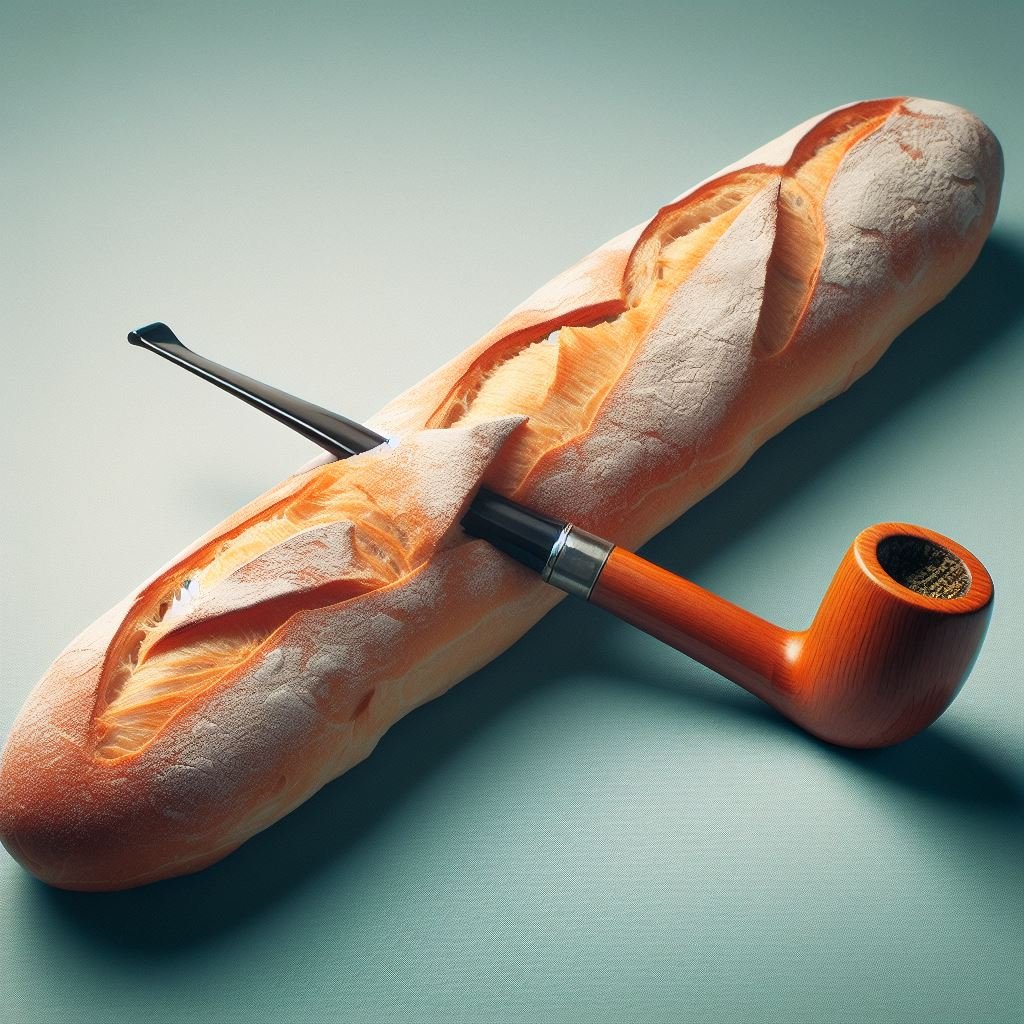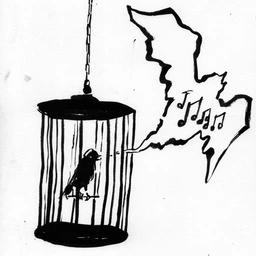In French, baguette means “long stick”. The bread name comes from this meaning, as it is a long, thin kind of bread :) We also call drum sticks “baguette”, as well as anything wooden, long and thin, like a conductor baton or a magic wand!
So basically, if you want to eat a baguette in Paris, make sure you’re in the right store.
Yes in French we call it “Baguette de Pain” so Long stick of bread. And baguette magique is magical long stick.
“Baguette de Pain”
expected this to be a stick of pain.
I know that breadfull.
You guys know there are more than just sticks out there right?
Yes, there are baguettes too.
Baguette à selfie.
Unfortunately people use the English word for it which sucks because this is correct and way better.
We can use “perche à selfie”, perche being a very long baton, itself being a big stick!
Ceci n’est pas une baguette

(While I was playing around with the Bing image generator, it gave me this, which I thought was too amazing not to share):

How bout quarterstaff?
They call it a baguette royale because of the metric system
Now I’m hungry for quarters with cheese.
I’d call it a “baton”, because it’s bigger
Baguette un quartre?
anything wooden, long and thin
So you’re saying that Jacob Rees-Mogg is considered a baguette in France?
Please stop doing this.
And because they mostly just say “wand” in the Harry Potter films, the French dub always uses the shorter “baguette” which made it pretty funny for me as a child learning French.
Is the wand shop called a bakery?
The French have like 5 different words for “bakery”
Boulanger (bread maker), pâtissier (cake maker)… what are the other 3?
marché du pain, prêt à manger, chez ta mére
That last one 😂😂
But only one word for all long stick-like things… Go figure
That’s just more civilized. Only barbarians such as anglos mix up businesses that make bread to those that make pastry .
Wait, does the word "baton’’ not exist in French? Because the in-universe French school is named Beauxbatons. Would Beauxbaguette have been more accurate?
Baton is also a similar word yeah, but maybe more reserved for bigger sticks like the ones you throw to your dog, baguettes are smaller more delicate.
That’s interesting, because for English-speakers, a baton is more closely associated with a delicate little conductor’s baton, though I suppose those big twirly sticks with pompoms that cheerleaders throw are also called batons.
Is a police beating stick not also called a baton?
police beating stick
Ahhh, the wonderful ambiguities of english grammar
As a woman, I read “magic wand” and I get horny.
deleted by creator
Other funny things. Underwear is “slip” (pronounced like sleep) and bathing suit is “slip de bain”
Reason fuckin one million to not take the French seriously
They call tea “the”. The what???
They have played us for absolute fools.
Thé*
ptsd flashbacks intensify
Years of research and development and yet no practical use found for words having gender. They have played us for absolute fools!
And worse, even native speakers don’t know them all. It’s 50/50 whether it’s un or une airplane, bus, trampoline…, depending of the speaker.
Am French, can confirm, gendered languages (there are lots of these!) would probably be better without them… But eh, languages in general are not known to be logical and practical. And English is not an exception!
Yeah English is really silly. I can only apologise for through / though / thought etc. The ough did used to make sense in pronunciation, but has long since fallen out of use.
Any good resources spring to mind for learning French btw? I’ve been smashing through Duolingo but it’s a 6/10 at best tbh.
No, sorry, I’m actually French so I would not really have use for these
I know that for English, subscribing to various EN youtube channels helped me a lot, but obviously you need some base level to understand enough of it for it to be useful
Also, I think learning how to write French is wayyy harder than learning to listen, read or even speak French, so I’d advise against really trying to be able to write, and focusing more on the 3 other aspects.
If you have French-related questions, feel free to pm me :)
deleted by creator
Some say gender can distinguish between similar-sounding words and what a pronoun refers to.
It’s true, at least in French. Because we “concord” (I’m not sure of the translation there) adjectives with the noun, it means that we can understand which adjectives is linked to which noun on complex sentences. Same with some determiners and articles.
A basic example: “Un abricot et des pommes juteuses” (An apricot and some juicy apples) Because in French adjectives comes after the noun, it could apply to either only the apples, or both fruits. But since apricot is masculine, apple is feminine, and “juteuses” is the feminine version of the adjective, we know it applies only to the apples.
But honestly? This feature is not THAT important imo. And it makes gendered languages so much more difficult to learn, even as a native speakers sometimes I misgender some words I’m not used to use.
And my example doesn’t even work if both fruits are the same gender, so it’s not like it is a critical feature of the language!
Le Weight D’Shake
deleted by creator
Well, it actually translates to “baguette magique”, so nothing to fix, here at least.
deleted by creator
They actually call it a Baguette Magique.
Source: I’m french. (Also, look at the other comments, they explain it better than I could)
deleted by creator
For one, it’s not google translate. And for another the translation is correct. I actually took a look at Harry Potter with french dub as I couldn’t believe it either and they definitely called their wands “baguette”. Also confirmed by other comments here.
Removed by mod
It took me a while to understand why us people would find that amusing.
Removed by mod
Removed by mod
Removed by mod
Removed by mod
Hon hon hon oui, oui madame, can je put mon baguette into your- hon hon hon- vageaux- honhonhon, oui oui, in your vageaux-hon hon hon
I’ll never understand why Americans do this. It’s so stupid. French people don’t even pronounce the H.














